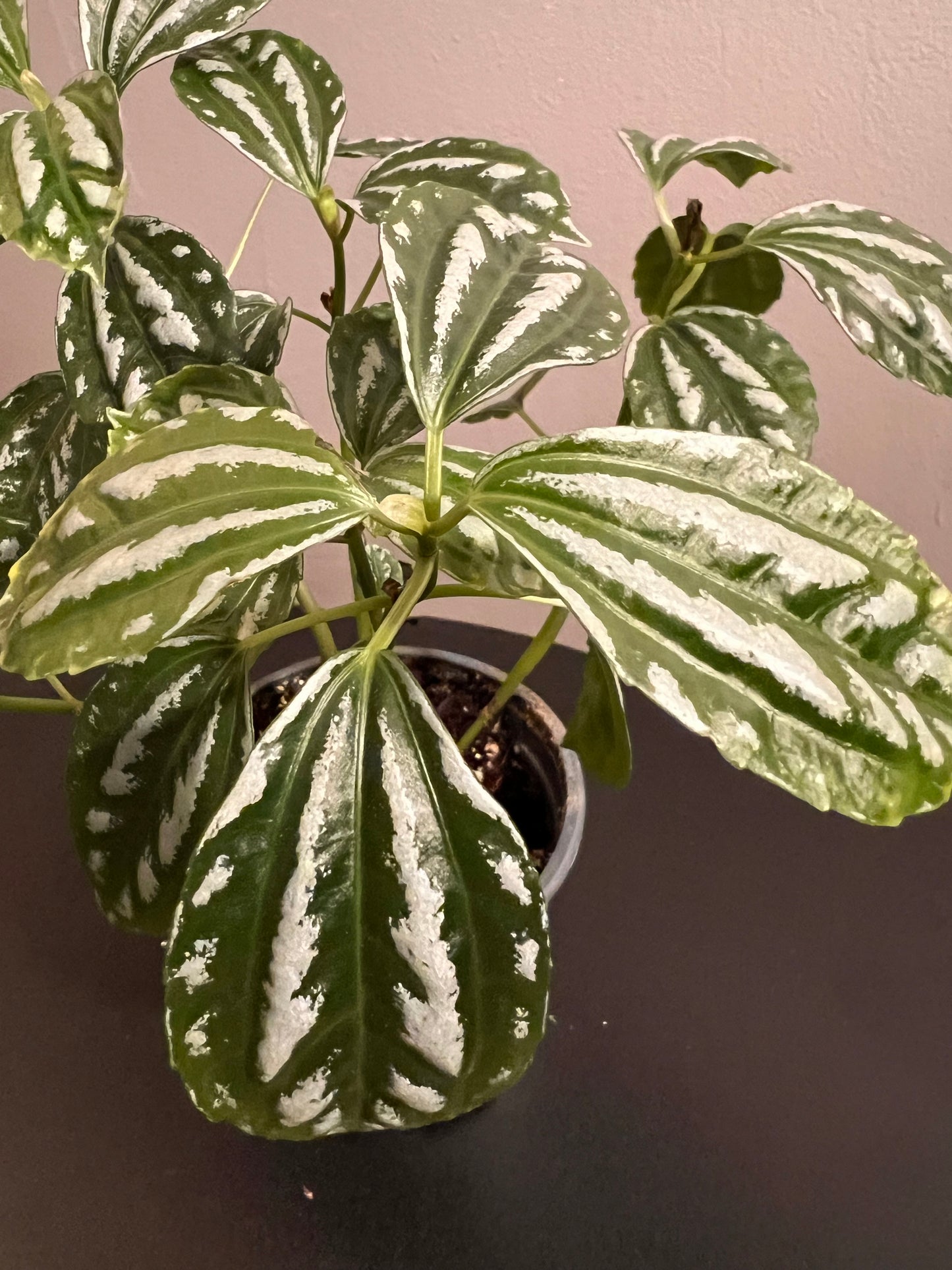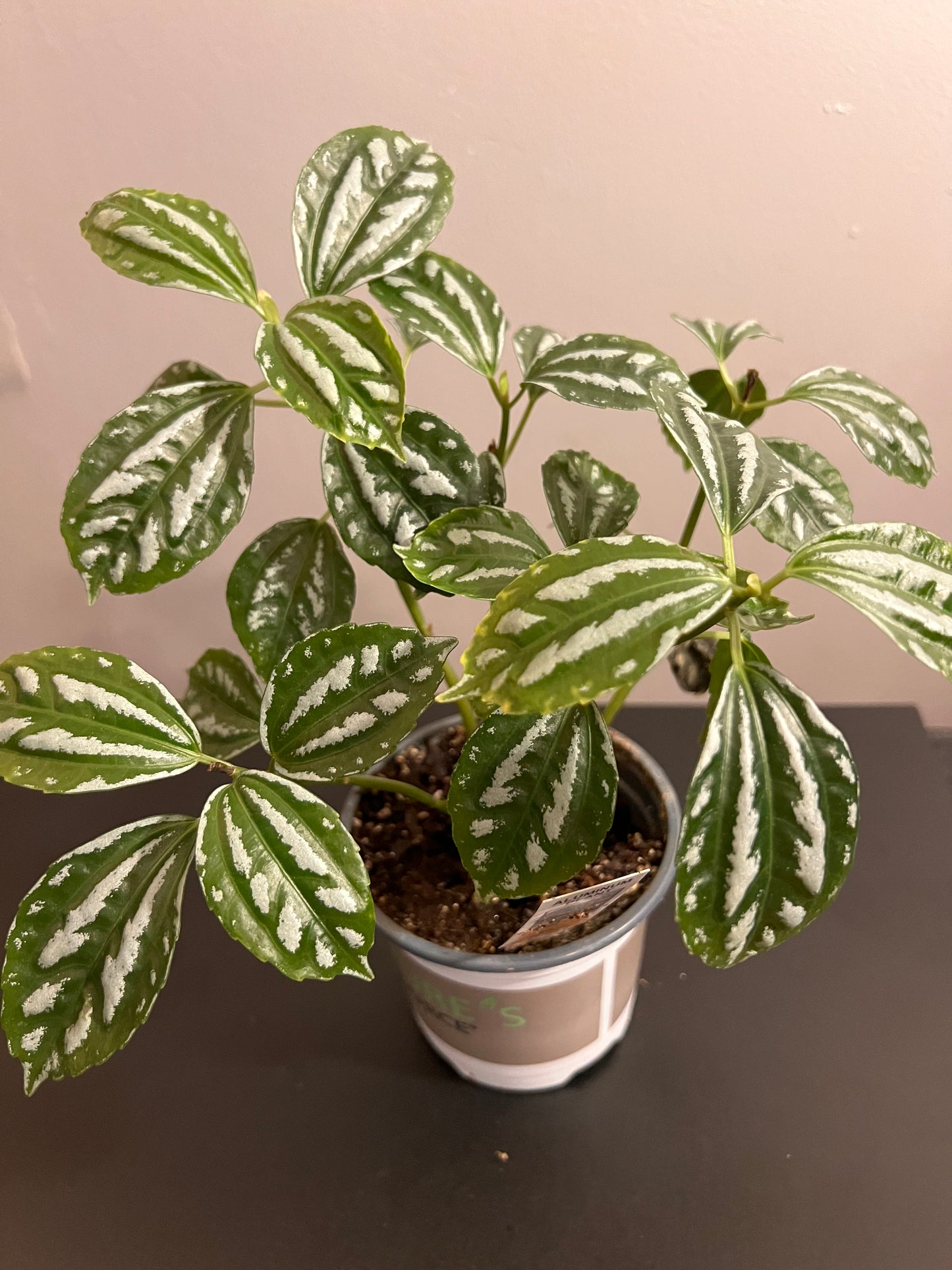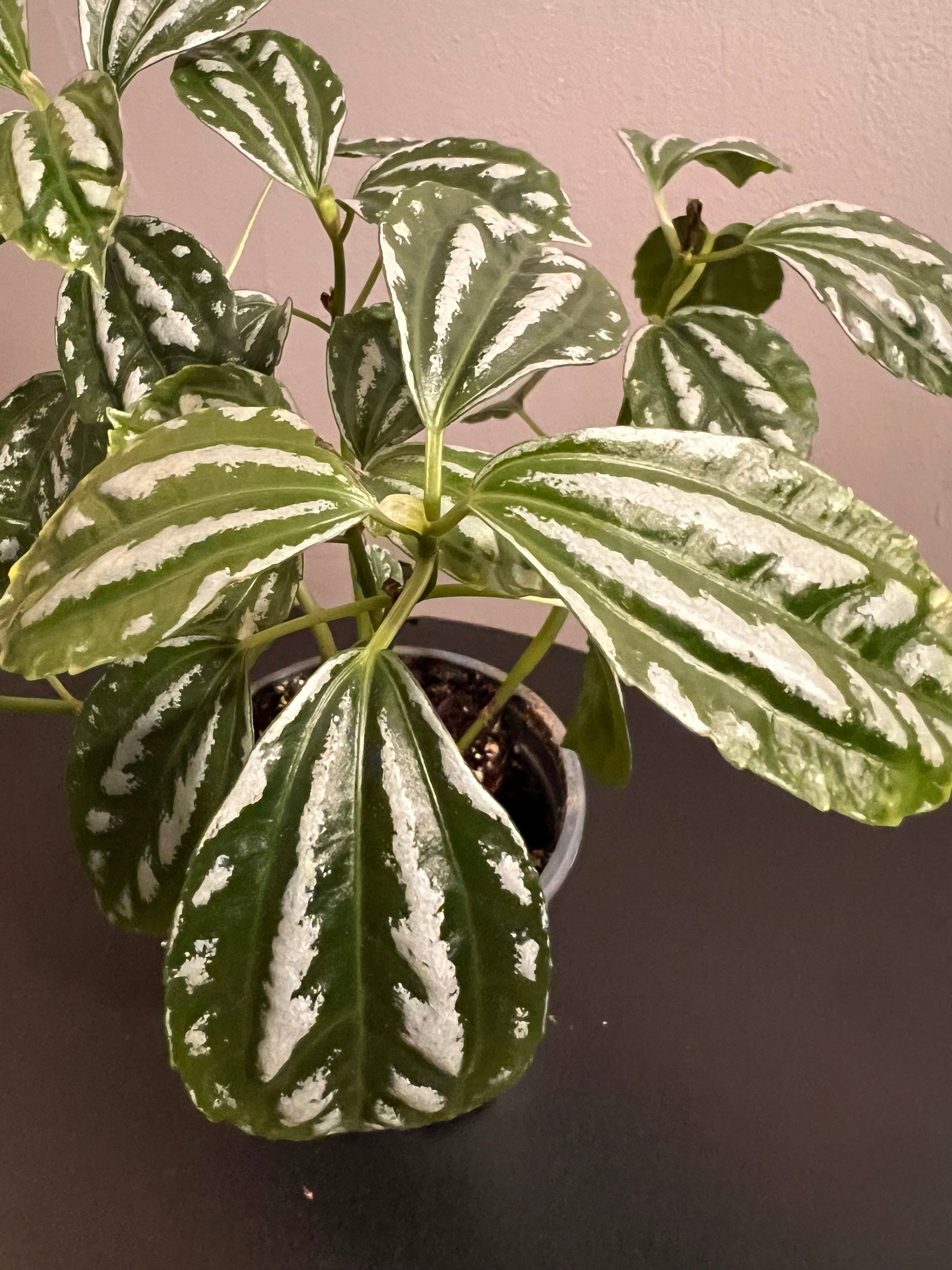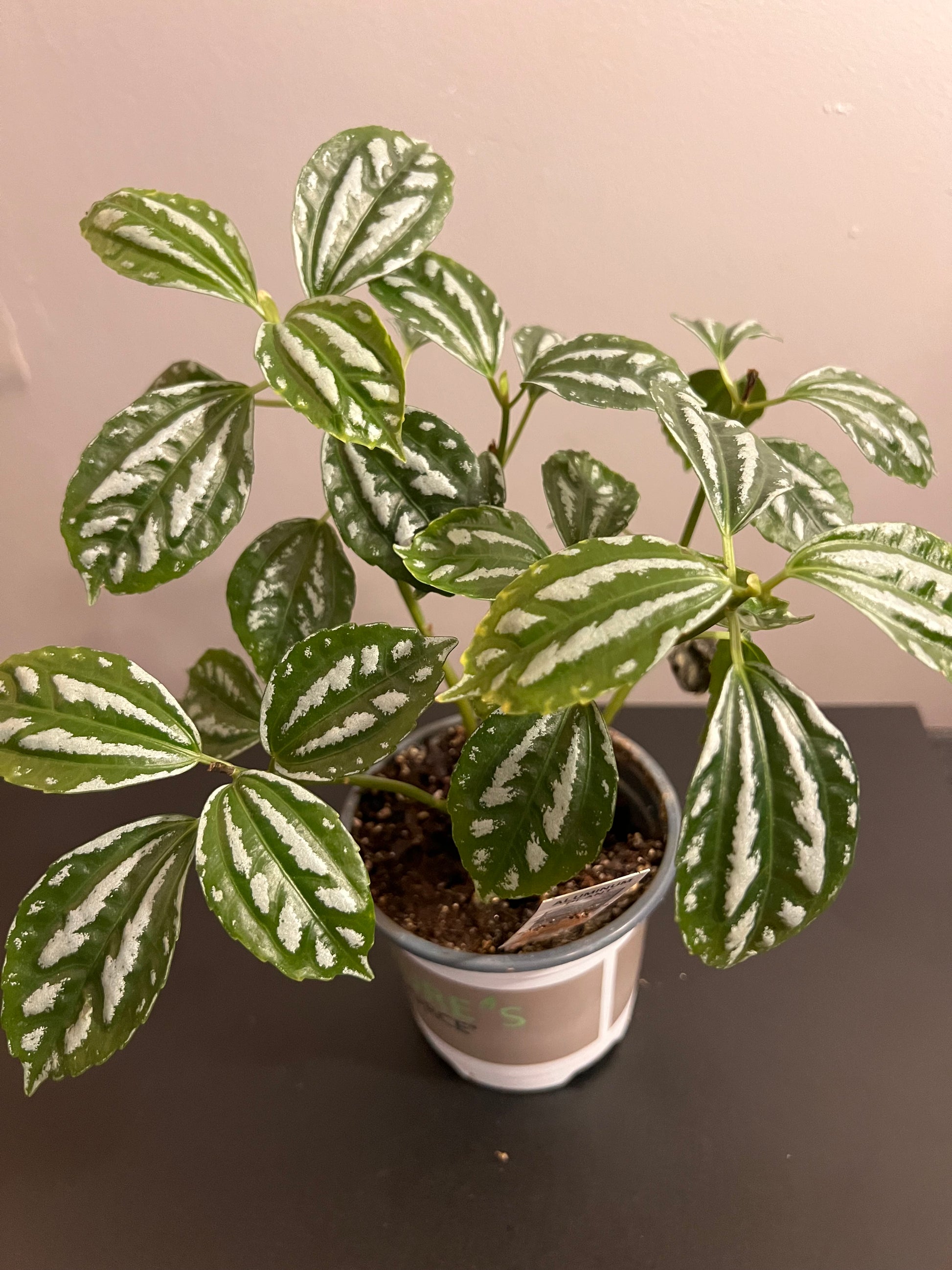Aluminum Plant (Pilea cadierei)
Aluminum Plant (Pilea cadierei)
The Aluminum Plant (Pilea cadierei) is a popular houseplant known for its striking foliage with metallic silver markings.
Growing Conditions
Light - Aluminum Plant (Pilea cadierei) prefers bright, indirect light. Direct sunlight can scorch the leaves, while low light can cause leggy growth.
Temperature - Ideal Range: 60-75°F (16-24°C). Protect from cold drafts and temperatures below 50°F (10°C).
Humidity - Aluminum Plant (Pilea cadierei) thrives in high-humidity environments. If the air is dry, especially in winter, consider using a humidifier or placing the plant on a humidity tray.
Soil - Well-Draining Soil: Use a peat-based potting mix with good drainage. A mix for African violets works well.
Watering - Moderate Watering: Keep the soil consistently moist but not soggy. Water when the top inch of soil feels dry. Reduce watering in the winter when the plant’s growth slows.
Fertilization - Balanced Fertilizer: Feed Aluminum Plant (Pilea cadierei) every 4-6 weeks during the growing season (spring and summer) with a balanced, water-soluble fertilizer diluted to half strength. Do not fertilize in the winter.
Potting and Repotting
Repot Aluminum Plant (Pilea cadierei) every 1-2 years or when the plant becomes root-bound. Choose a pot that is 1-2 inches larger in diameter than the current pot.
Pruning
Regular Pruning: Prune Aluminum Plant (Pilea cadierei) regularly to maintain a bushy shape and remove any leggy or dead growth. Pinch back new growth to encourage branching.
Pests and Problems
Common Pests: Watch for common houseplant pests like spider mites, mealybugs, and aphids. Treat infestations promptly with insecticidal soap or neem oil.
Diseases: Overwatering Aluminum Plant (Pilea cadierei) can lead to root rot. Ensure the plant is in well-draining soil and avoid waterlogging.
Growing Zones
Hardiness Zones: The Aluminum Plant is typically grown as a houseplant and is not suited for outdoor planting in most climates. It can be grown outdoors in USDA hardiness zones 10-11.
Uses
Ornamental: Aluminum Plant (Pilea cadierei) is primarily used as an ornamental plant for its attractive foliage. It adds a decorative touch to indoor spaces.
Air Purification: Like many houseplants, it can help improve indoor air quality by removing toxins from the air.
Additional Tips
Avoid Drafts: Keep Aluminum Plant (Pilea cadierei) away from cold drafts, which can damage the foliage.
Rotate the Plant: Rotate Aluminum Plant (Pilea cadierei) occasionally to ensure even growth and prevent it from leaning towards the light source.
---SHIPPING NOTICE PLEASE READ BEFORE PURCHASING LIVE PLANTS!---
We WILL NOT refund the purchase of or the shipping cost of live plants purchased with the intent to be shipped to states that do not authorize importing live plants or to states with restrictions! Purchases to these states will be held for 30 days for pick-up at our Slidell, Louisiana store and the shipping cost associated with these purchases will be held for the care of the plant while waiting to be picked up. All sales are final. If the plant(s) purchased are not picked up within 30 days from the date of order, these items will be returned to our sales inventory and you WILL NOT be refunded. Thank you for understanding these policies.
Due to regulations, certain states have restrictions on importing plants. Please review the list below to ensure you're not attempting to order any restricted plants in your area.
**Important Note:** We do not ship any plants outside the U.S.
State-Specific Restrictions - We ARE NOT responsible for any plant(s) that are not listed in these restrictions. Purchaser bears all responsibility for making sure the plant(s) they desire to purchase are not banned from being imported to the shipping state:
Arizona: Juglans spp.
California: Castanea spp., Juglans spp., Pinus spp., Quercus spp.
Colorado: Some counties restrict Prunus spp. Please verify your local county regulations.
Florida: Castanea spp., Cornus spp., Quercus spp., Cornus mas
Georgia: Vaccinium spp.
Hawaii: Pinus spp.
Idaho: Humulus lupulus, Mentha spp., Vitis spp.
Indiana: Fragraria spp., Rosa spp.
Kansas: Juglans spp.
Michigan: Abies spp., Vaccinium spp.
Montana: Pinus spp.
Nevada: Allium spp.
Mentha spp.
New Jersey: Rosa spp.
New York: Vitis spp.
Oregon: Allium spp., Castanea spp., Corylus spp., Humulus lupulus, Quercus spp., Sambucus nigra, Ulmus spp., Vaccinium spp., Vitis spp.
Texas: Juglans spp.
Washington: Allium spp., Castanea spp., Corylus spp., Humulus lupulus, Vaccinium spp., Vitis spp.
Wisconsin: Abies spp., Pinus spp., Picea spp., Mentha spp.
Additionally, we cannot ship plants in soil medium to the following states: AK, AL, AR, AZ, CA, HI, ID, KS, MS, MT, ND, NM, NV, OK, OR, SD, TX, UT, WA.
Couldn't load pickup availability




